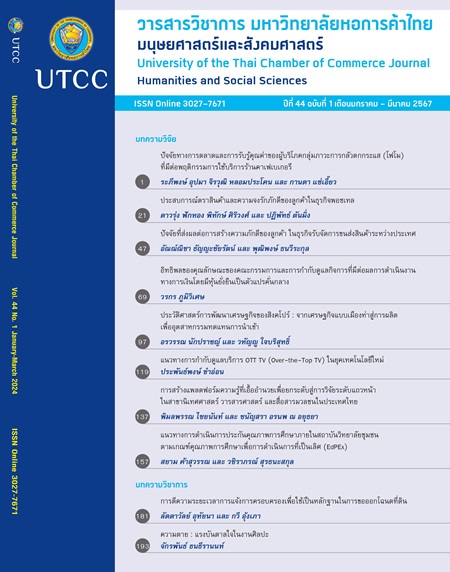Brand Experience and Customers Loyalty of Poshtel Business
Main Article Content
Abstract
The purposes of this study were: 1) to synthesize the state of the poshtel business and 2) to synthesize the factors linking customer brand experience to brand loyalty in the poshtel business. The qualitative research approach was selected. The researcher employed the content analysis methodology and utilized QDA Miner-Lite software. Key informants included poshtel entrepreneurs and customers who utilized and reviewed the poshtel business. Information was collected from 1) the official websites and social media of the poshtel businesses, and 2) customer reviews from online travel agents, comprising 9 poshtel business case studies selected based on specific criteria. The research yielded the following results: 1) The situation encompassed customer types and distinctive characteristics of the new era poshtel business; and 2) The customer brand experience factor comprised 12 factors categorized into 3 main themes including poshtel brand experience, experiential and emotional value, and brand loyalty. The study's findings can serve as guidelines to foster valuable customer experiences and generate business value. Furthermore, it offers insights into studying dimensions of brand experience that can inform the development of innovative business strategies and knowledge, thereby establishing a competitive edge for poshtel businesses and other lodging.
Article Details

This work is licensed under a Creative Commons Attribution-NonCommercial-NoDerivatives 4.0 International License.
ลิขสิทธิ์ของบทความ
ผลงานที่ได้รับการตีพิมพ์ถือเป็นลิขสิทธิ์ของมหาวิทยาลัยหอการค้าไทย ห้ามมิให้นำเนื้อหา ทัศนะ หรือข้อคิดเห็นใด ๆ ของผลงานไปทำซ้ำ ดัดแปลง หรือเผยแพร่ ไม่ว่าทั้งหมดหรือบางส่วนโดยไม่ได้รับอนุญาตเป็นลายลักษณ์อักษรจากมหาวิทยาลัยหอการค้าไทยก่อน
References
Krungsri Plearn Plearn. (ม.ป.ป.). Poshtel ที่พักแนวใหม่ อัพเกรดความสบายแบบชิคๆ. สืบค้นเมื่อ 10 มกราคม 2566, จาก https://www.krungsri.com/th/plearn-plearn/poshtel-budget-hotel
ดาวรุ่ง ฟักทอง, ชิษณุพงศ์ ศิริโชตินิศากร, และปรเมษฐ์ ดำชู. (2565). การสร้างความทรงจำด้วยการจัดการภูมิทัศน์ประสบการณ์สำหรับธุรกิจโรงแรม. วารสารวิชาการมหาวิทยาลัยหอการค้าไทย มนุษยศาสตร์และสังคมศาสตร์, 42(4), 171-189. สืบค้นจากhttps://utcc2.utcc.ac.th/utccjournal/424/171_189.pdf
นฐพร สุวรรณวิศลกิจ. (2560). แนวทางการตัดสินใจลงทุนในธุรกิจลักซ์ชูรีโฮสเทล (LUXURY HOSTEL) ในเขตพื้นที่กรุงเทพมหานคร (วิทยานิพนธ์ปริญญามหาบัณฑิต, มหาวิทยาลัยธรรมศาสตร์). สืบค้นจาก http://ethesisarchive.library.tu.ac.th/thesis/2017/TU_2017_5916033060_8631_8082.pdf
พรสวรรค์ บุญสถิตย์, อรจิรา สันติวราคม, และสุทธิชัย ทองเขาอ่อน. (2563). พอสเทล: เทรนด์ใหม่ของธุรกิจโรงแรมในยุคไทยแลนด์ 4.0. วารสารครุศาสตร์ ปริทรรศน์ฯ, 7(1), 301-317.
มุมมองใหม่ต่อการท่องเที่ยวเชิงนันทนาการ. (2565). รายงานภาวะเศรษฐกิจการท่องเที่ยว, 3(1), 80-91. สืบค้นจาก https://www.mots.go.th/news/category/663
วรพันธุ์ คล้ามไพบูลย์, และจิตติพันธ์ ศรีกสิกรณ์. (2558). The hostel bible. กรุงเทพฯ: ซูเปอร์กรีนสตูดิโอ.
ศูนย์วิจัยกสิกรไทย. (2565). ปี 2566 ธุรกิจโรงแรมและที่พักทยอยฟื้นตัว แต่ภายใต้มุมมองที่ระมัดระวังมากขึ้น (กระแสทรรศน์ ฉบับที่ 3351). สืบค้นเมื่อ 13 ธันวาคม 2565, จาก https://www.kasikornresearch.com/th/analysis/k-econ/business/Pages/Hotel-z3351.aspx
Aaker, D. A. (1991). Managing brand equity: Capitalizing on the value of a brand name. New York, NY: The Free Press.
Brakus, J. J. k., Schmitt, B. H., & Zarantonello, L. (2009). Brand experience: What is it? How is it measured? Does it affect loyalty? Journal of Marketing, 73(3), 52-68. doi:10.1509/jmkg.73.3.52
Erlingsson, C., & Brysiewicz, P. (2017). A hands-on guide to doing content analysis. African Journal of Emergency Medicine, 7(3), 93-99. doi:10.1016/j.afjem.2017.08.001
Fu, Y.-K., & Wang, Y.-J. (2020). Experiential value influences authentic happiness and behavioral intention: Lessons from Taiwan’s tourism accommodation sector. Tourism Review, 76(1), 289-303.
Gómez-Suárez, M., & Veloso, M. (2020). Brand experience and brand attachment as drivers of WOM in hospitality. Spanish Journal of Marketing-ESIC, 24(2), 231-246. doi:10.1108/SJME-12-2019-0106
Huaman-Ramirez, R., & Merunka, D. (2019). Brand experience effects on brand attachment: The role of brand trust, age, and income. European Business Review, 31(5), 610-645. doi:10.1108/EBR-02-2017-0039
Ibrahim, B. (2021). The nexus between social media marketing activities and brand loyalty in hotel facebook pages: A multi-group analysis of hotel ratings. Tourism: An International Interdisciplinary Journal, 69(2), 228-245. doi:10.37741/t.69.2.5
Kandampully, J., Bilgihan, A., & Amer, S. M. (2023). Linking servicescape and experiencescape: Creating a collective focus for the service industry. Journal of Service Management, 34(2), 316-340. doi:10.1108/JOSM-08-2021-0301
Kanerva, P. (2017). Poshtels - The next accommodation option in Barcelona? (Bachelor's thesis, Haaga-Helia University of Applied Sciences). Retrieved from https://www.theseus.fi/bitstream/handle/10024/129521/Kanerva_Petra.pdf?sequence=1&isAllowed=y
Kang, J., Manthiou, A., Sumarjan, N., & Tang, L. (2017). An investigation of brand experience on brand attachment, knowledge, and trust in the lodging industry. Journal of Hospitality Marketing & Management, 26(1), 1-22. doi:10.1080/19368623.2016.1172534
Khan, I., & Rahman, Z. (2017). Development of a scale to measure hotel brand experiences. International Journal of Contemporary Hospitality Management, 29(1), 268-287. doi:10.1108/IJCHM-08-2015-0439
Kouakou, K. K. E., Li, C., Akolgo, I. G., & Tchamekwen, A. M. (2019). Evolution view of entrepreneurial mindset theory. International Journal of Business and Social Science, 10(6), 116-129. doi:10.30845/ijbss.v10n6p13
Lim, X. J., Cheah, J. H., Cham, T. H., Ting, H., & Memon, M. A. (2020). Compulsive buying of branded apparel, its antecedents, and the mediating role of brand attachment. Asia Pacific Journal of Marketing and Logistics, 32(7), 1539-1563. doi:10.1108/APJML-03-2019-0126
Mathwick, C., Malhotra, N., & Rigdon, E. (2001). Experiential value: Conceptualization, measurement and application in the catalog and Internet shopping environment. Journal of retailing, 77(1), 39-56. doi:10.1016/S0022-4359(00)00045-2
Mody, M. A., Suess, C., & Lehto, X. (2017). The accommodation experiencescape: A comparative assessment of hotels and Airbnb. International Journal of Contemporary Hospitality Management, 29(9), 2377-2404. doi:10.1108/IJCHM-09-2016-0501
Mostafa, R. B., & Kasamani, T. (2021). Brand experience and brand loyalty: Is it a matter of emotions? Asia Pacific Journal of Marketing and Logistics, 33(4), 1033-1051. doi:10.1108/APJML-11-2019-0669
Phromlert, C., Deebhijarn, S., & Sornsaruht, P. (2019). How website quality, e-service quality, e-satisfaction, and social value affect poshtel e-loyalty in Thailand. African Journal of Hospitality, Tourism and Leisure, 8(5), 1-14. Retrieved from https://www.ajhtl.com/uploads/7/1/6/3/7163688/article_88_vol_8_5__2019_thailand.pdf
Pine, B. J., & Gilmore, J. H. (1999). The experience economy: Work is theatre and every business a stage. Boston, MA: Harvard Business School Press.
Rahman, M. (2014). Differentiated brand experience in brand parity through branded branding strategy. Journal of Strategic Marketing, 22(7), 603-615. doi:10.1080/0965254X.2014.914061
Shen, A., & Ball, A. D. (2009). Is personalization of services always a good thing? Exploring the role of technology‐mediated personalization (TMP) in service relationships. Journal of Services Marketing, 23(2), 80-92. doi:10.1108/08876040910946341
Sørensen, F., & Jensen, J. F. (2015). Value creation and knowledge development in tourism experience encounters. Tourism Management, 46(4), 336-346. doi:10.1016/j.tourman.2014.07.009
Thurmond, V. A. (2001). The point of triangulation. Journal of nursing scholarship, 33(3), 253-258. doi:10.1111/j.1547-5069.2001.00253.x


